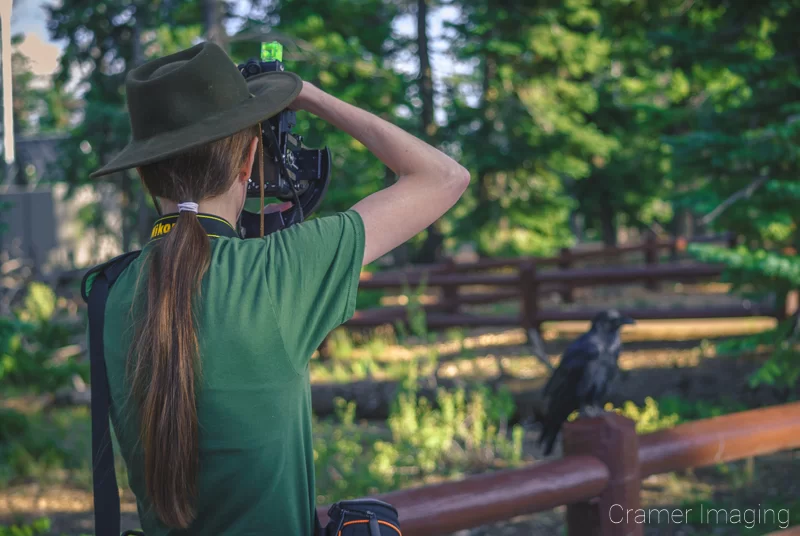Lots of people these days walk around claiming to be professional photographers. Sadly, many are not, or are not yet. The trick becomes recognizing the truly professional photographers from those who are actually amateurs. Thankfully, there are a few ways in which you can separate the metaphorical wheat from the chaff in the world of photographers. Today, we’re discussing 4 big ways in which you can identify a photographer as a true professional photographer.

While the true difference between a professional photographer and a non-professional photographer (such as an amateur) is merely whether or not they get paid for their efforts, there are some other standards which have come to be associated with a ‘professional’ standard of work.
The Product
The first way to tell that you are dealing with a professional photographer is to look at the quality of the photos(s)/product(s) offered. Do these products look to be of high quality or do they look like something you could duplicate on your camera and printer at home? That is something you should be asking yourself if it is not immediately apparent what the answer is.

Professional photographers can spend years perfecting the art of taking just the right photograph. It also shows in their portfolios. They have lots of amazing images for you to take a look at. Most often, such prints make you want to be that person or go to that location.
You will not see blurry photos (unless that was the intention). You will not see photos where a person’s face is out of focus. Also, you will not see washed out colors in direct sunlight (again, unless that was the intention). A professional photographer takes the time to cull their photos and only shows you the best photos possible. He or she also strives to improve those photos over time to be even better and rotates out lesser quality photos so that all you see is the very best.
Professional photographers also join forces with professional print shops (unless they have their own professional quality printers onsite). Selling prints of archival quality is an expected part of the industry now. If the prints a photographer offers are not ‘archival quality’ or he/she doesn’t know what that means, that’s a red flag.

For those photographers who offer matting and framing, albums, and other products, take a hard look at those products. Are they something which you would be proud to display? Or do they look like someone grabbed a cheap frame from Wal-Mart? Offering quality peripheral products is also the mark of a truly professional photographer.
Communication and Expectations

Another mark of a professional photographer is how he or she manages your expectations and how he or she communicates with you. Professional photographers will not drop off the grid for days and weeks at a time. They will reply back to your questions within a business day or two. Sometimes they will be right on top of your questions and give you an answer right away.
They will start by letting you know what to expect right off the bat. You should receive a time frame in which to expect turnaround (meaning you know about when your photos will be ready). You should know about how many photos to expect in the final package. Again, you should also know about how much this experience/project is going to cost. All that should be set out up front. There should be no surprises if everything goes right, and most of the time, it does go right for a professional photographer thanks to knowledge, practice, and preparation.
As things progress, there are bound to be issues which come up. You might not like how a photo turned out or something might happen on the photographer’s end (e.g. memory card corrupts). When such issues come up, a professional photographer will quickly let you know what is happening and propose a way in which to deal with the problem. He or she gets bonus professional photographer points for having more than one solution to the problem. With event photography (such as weddings), there might not be a good solution if something goes wrong, but a professional photographer will still try to satisfy you as the client.
Legal Framework (contracts, LLC, etc.)
A truly professional photographer will have a business and legal framework set up. He or she will have a way to handle sales tax. He or she will have registered the photography business with the state and probably set up a LLC (limited liability corporation) as a business structure. Want to find out if your photographer has this kind of business structure? Check the footer of their website or the wording of their contract. Businesses which have this kind of business structure will tend to make this information visible when possible.

Also, speaking of contracts, a true professional photographer will have a contract for you to sign. It will lay out most of the terms and conditions of the business transaction you both are entering into. It’s one way to manage expectations and set up how, when, and what the photographer will communicate with you. Legally binding contracts will protect both you and the photographer from lots of different potential problems and, in the case of a dispute, set before a court of law what you both agreed to before entering into a business relationship regarding photography.
All of this sounds really fancy and perhaps a bit nebulous. Simply put, a true professional photographer will take all the legal steps necessary to ensure a proper business relationship and business transaction between themselves and you as the client. You won’t be able to miss this part.
The Experience
Have you ever had an experience which made you just want to get to a computer in privacy as soon as possible to leave a truthful but scathing review? It was thanks to a bad experience, right? You remember those experiences very well. You also remember good experiences too.
The point of seeking out a professional photographer is to have some photos taken. However, a truly professional photographer will do more than just take and deliver photos like a photo booth. He or she will take the time to make sure that your experience throughout the process is as pleasant as possible.

A truly professional photographer will take the time to get to know you and your vision for the project/photo session. He or she will make a serious effort to make this vision of yours come true in addition to his/her own vision. The synergy is what really makes a project/session come alive.

A professional photographer will also be prompt about delivering the requirements listed on the contract and go above and beyond where possible. This might be a surprise gift, an early delivery date, or many other little details which catch your attention.
Overall, a true professional photographer hopes that this will not be a one-time business transaction. He or she hopes that this will be the start of a mutually beneficial business relationship. This means that the experience must be positive in every way possible for both of you. A true professional will make a serious effort to make the experience a positive one for you. After all, what will resonate with you the most, after all is said and done, is the experience which the both of you had together.
If the experience is good enough, you should be happy to award a truthful review full of praise.
Conclusion
In conclusion, the way to recognize a true professional photographer is to look at the little things. What kind of product/service is offered. How will the photographer communicate? Do you see a legal framework which can protect you in case of problems? What kind of experience will you have, and can you expect out of the experience? If you can answer these simple questions quickly and easily (preferably off the photographer’s website), then you’ve found yourself a truly professional photographer.




